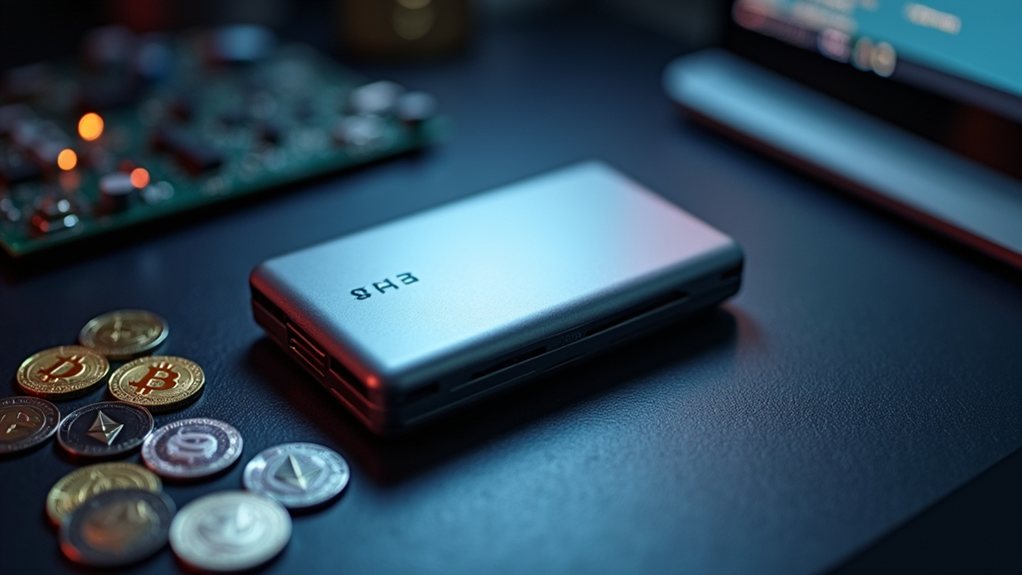A crypto wallet is a digital tool that manages cryptocurrency transactions. It doesn't store actual coins but holds the private and public keys needed to access blockchain assets. Wallets come in different forms: hot wallets stay connected online, while cold wallets remain offline for better security. Users can choose between custodial wallets managed by third parties or non-custodial options where they control their keys. The right wallet choice depends on security needs and usage patterns.

A crypto wallet is a digital tool that helps people manage their cryptocurrency holdings. Despite its name, it doesn't actually store digital coins. Instead, it stores the public and private keys needed to interact with the blockchain where cryptocurrency transactions are recorded. The public key works like an address where others can send coins, while the private key acts as a password that lets the owner send their coins to others.
Crypto wallets come in several different types, each with unique features and security levels. Hot wallets stay connected to the internet, making them convenient for frequent transactions but potentially more vulnerable to hackers. Cold wallets, on the other hand, remain offline and provide better security for long-term storage. Users who prefer to control their own keys often choose non-custodial wallets, while those who want less responsibility might opt for custodial wallets managed by third parties. Some wallets like MyEtherWallet and Electrum are software wallets that can be installed on computers or mobile devices.
The choice between hot, cold, custodial, or non-custodial wallets defines your balance of convenience, security, and control.
The core components of any crypto wallet include public and private keys, along with a user interface for checking balances and making transactions. Many wallets also provide a seed phrase – a series of random words that serve as a backup to recover access if the original wallet is lost or damaged. This seed phrase should be written down and stored in a secure location, never digitally. Losing your private key in a non-custodial wallet means complete loss of access to your cryptocurrency assets.
Security is a major concern for wallet users. Modern wallets often include features like two-factor authentication, which requires a second verification step beyond a password. Some mobile wallets use biometric security like fingerprint scanning or facial recognition. Hardware wallets take security further by storing private keys on a physical device that resembles a USB drive. To further enhance protection against online threats, hardware wallets implement offline storage of private keys, significantly reducing vulnerability to malware and hacking attempts.
Wallets vary in functionality as well. Basic wallets simply allow users to check balances and send or receive cryptocurrencies. More advanced wallets support multiple currencies, connection to decentralized applications (dApps), and even built-in exchange services to swap between different cryptocurrencies.
Popular wallet brands include hardware devices like Ledger and Trezor, software options like MetaMask and Exodus, and mobile apps like Trust Wallet and Coinbase Wallet. The best choice depends on individual needs – frequent traders might prefer the convenience of a mobile wallet, while those with large holdings often select the enhanced security of hardware wallets.
When selecting a wallet, crypto users typically consider which cryptocurrencies they need to store, how often they'll make transactions, and their personal security requirements. They also review the wallet's reputation in the community and the quality of its customer support.
As the cryptocurrency ecosystem continues to evolve, wallet technology keeps advancing to provide better security and more features for users.
Frequently Asked Questions
Can My Crypto Wallet Be Hacked?
Yes, crypto wallets can be hacked. Cybercriminals use methods like phishing, malware, and clipboard hijacking to steal digital assets.
Weak passwords, outdated software, and poor key management increase vulnerability. Hardware wallets offer better protection than online options.
Hackers can't be reversed once they've stolen cryptocurrency. Multi-factor authentication and security updates help reduce risks.
Most attacks target user errors rather than the wallet technology itself.
How Much Does a Crypto Wallet Cost?
Crypto wallet costs vary widely.
Software wallets are typically free to download but may charge transaction fees or subscription fees of $1-5 monthly. Premium features often cost extra.
Hardware wallets require upfront purchases ranging from $49-$250, with popular models like Ledger Nano S ($59) and Trezor One ($55).
All wallets incur transaction fees when sending crypto, which vary by blockchain network and congestion levels.
What Happens to My Crypto if I Lose My Wallet?
When someone loses their crypto wallet, their coins aren't actually gone. They remain on the blockchain, but become inaccessible without the private keys.
It's like having money in a safe without the combination. Recovery is possible with backup seed phrases, but without these backups, the funds may be permanently lost.
Approximately 20% of all Bitcoin is estimated to be in lost wallets, worth billions of dollars.
Can I Transfer Between Different Types of Wallets?
Users can transfer cryptocurrencies between different wallet types if they're on the same blockchain.
Moving assets from hot to cold wallets or between custodial and non-custodial options is possible by sending to the correct address. Each transfer incurs network fees and requires confirmation time.
However, transfers between incompatible blockchains need special bridge technologies. Users must verify address formats to prevent losing funds during transfers.
Are Crypto Wallets Regulated by Financial Authorities?
Crypto wallets face varying regulations worldwide.
Custodial wallets, where companies hold users' funds, are typically regulated as money transmitters and must follow AML and KYC rules.
Non-custodial wallets, where users control their own keys, remain mostly unregulated.
In the U.S., FinCEN classifies some wallet providers as money services businesses.
The FATF provides global guidance, but there's no universal regulatory approach across countries.














